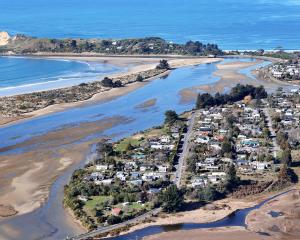
Saturday’s meeting at the Alexandra District Club was hosted by Central Otago Grey Power and was solely for the district’s mayoral candidates.
The meeting attracted a full house with spirited questions.
All mayoral candidates agreed rates could not continue to climb and the council needed to be more strategic about that.
Mayoral and Teviot ward candidate Mark Quinn, of Roxburgh, had perhaps the most radical suggestion proposing large businesses such as Santana Mining be charged a percentage of turnover or income — 2% of turnover was suggested — which would give the council $100m and no-one would have to pay any rates, he said.
Incumbent mayor Tamah Alley showed the advantage of being in the system with her rebuttal of suggestions from the other candidates — Charlie Sanders, of Cromwell, and Mr Quinn — neither of whom have held an elected council role before.
Mr Quinn said he would create a youth council forum. Mrs Alley said there already was one.
He criticised the council spending on cycle trails. Mrs Alley said the only cycle trail the council funded was Clyde to Alexandra.
Mr Quinn said he would institute a full restructure of the council staff and systems with all staff measured by key performance indicators (KPIs).
Mrs Alley pointed out the councillors were responsible for just one employee, the chief executive, and no others.
In response to a question from the floor she said council staff were working to KPIs.
On Thursday evening the Roxburgh and Districts Lions organised and chaired a meeting that included the Teviot ward candidates and those standing for the Teviot Valley Community Board.
In Roxburgh, Mr Sanders said the council should stick to core services and gave the example of $45 million being spent on the Cromwell hall when poor water infrastructure was hindering the town’s expansion.
Mrs Alley said the cost of the hall was coming from endowment land sales which could only be spent in Cromwell.
Last year’s decision to spread most costs evenly across the district meant the endowment funds could not be spent on infrastructure as it would benefit the whole district, not just Cromwell.
Mr Sanders said he was not standing for ambition but for Central Otago.
There needed to be a change in council culture and systems needed to be improved.
Mr Quinn, who along with Mr Sanders stressed his business experience, said he would rescind the decision to create a council controlled organisation to manage water services.
When asked if that was possible he said it was and hoped ‘‘it hadn’t gone too far’’.











